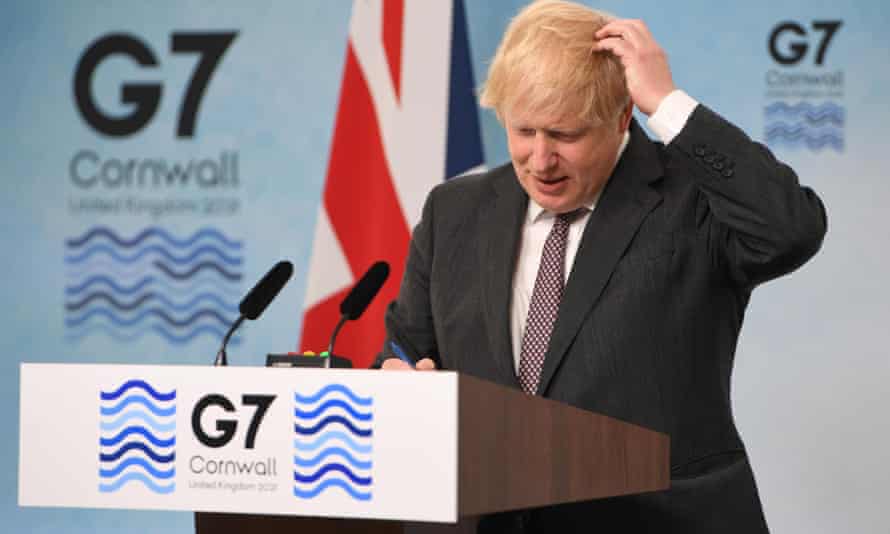On vaccine equality, the UK has failed to show the leadership the world needs
Britain has broken the promises Boris Johnson made before the G7 – a change of tack is necessary to make Cop26 a success

Covid and the climate crisis are the two defining global crises of our time and Britain has a crucial role to play in addressing them both. As the Cop26 host, it will be responsible for overseeing a successful outcome at the UN climate talks in Glasgow in November.
Only a few weeks ago, before the prime minister hosted the G7, Boris Johnson promised the group of wealthy nations would vaccinate the world by the end of the year.
After failing dismally to deliver on this pledge, the UK government is trying to rush delegates to Cop26 a Covid vaccine in order to keep its climate conference on the road at all costs. The sudden and hurried announcement pushes those who want to attend Cop to register for a vaccination by 23 July. This puts many people, especially in poorer nations and from vital civil society groups, in the invidious position of having to choose to get a vaccine before the frontline workers and vulnerable groups in their own countries.
This moral dilemma could be avoided if rich nations at the G7, under the UK’s leadership, had stepped up with a real plan to achieve global vaccine equity. They did not. Instead, they have perpetuated the vaccine apartheid we are experiencing.
More than 100 former presidents and prime ministers had written to the G7, urging them to bankroll at least two-thirds of the $66bn (GBP48bn) needed by low-income countries for Covid vaccines. But rather than paying up the $44bn that such an undertaking would cost, they instead offered a measly $7bn.
The former UK prime minister Gordon Brown lambasted Johnson’s broken promises. He said the summit would be remembered as an “unforgivable moral failure”. In Africa, Covid cases rose by 25% last week. At the present infection rate, and to vaccinate only 10% of the most vulnerable among the population, the continent would need 225m vaccine doses. But the UK offered just 5m doses – 2% of what is required.
Sub-Saharan Africa accounts for less than 1% of the near billion fully vaccinated people around the world. According to Oxfam, it would take 57 years for the world to be safe from Covid-19 if the rate of vaccination in low-income countries were to be maintained. This is unacceptable, morally reprehensible and shortsighted.
Not only has the UK failed to deliver enough jabs, it has blocked efforts to waive patents that would see global vaccine production accelerated. This makes a mockery of the G7’s attempts to pose as allies of developing countries. They are not.
So, the UK’s offer of vaccinating delegates to attend Cop26 must be viewed against the backdrop of vaccine inequity. The offer cannot be the only intervention from the Cop26 and G7 president. Much more is required from it. Otherwise, it would appear the UK is interested only in keeping its United Nations show on the road and politically cashing in on the Cop climate summit, rather than actually doing anything meaningful to tackle the vaccine apartheid it has helped to create around the world.
These are the actions of a small and inward-looking government, not one taking its international responsibilities seriously. Nor does it appear to understand the importance of solidarity during a global crisis.
As the host of Cop26, the UK needs to be viewed as a trusted broker that can be taken seriously. All the talk of “global Britain” from Johnson suggested this would be one of the benefits of Brexit. However, we have seen a botched G7 promise on vaccines, a cut to international aid in the middle of a pandemic, and now a chaotic system to provide vaccines to delegates before Cop26.
For the UK’s sake, for the fate of millions across the world and for the fate of the climate, we need to see Johnson change tack and lead.
-
Mohamed Adow is director of Power Shift Africa, a Kenyan climate and energy thinktank. He is a longtime observer of the UN climate talks.
-
Tasneem Essop is executive director of Climate Action Network, an international group of more than 1,500 civil society organisations working on the climate crisis, social justice and sustainability in more than 130 countries.